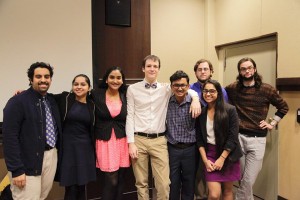UR’s Debate Union is a competitive academic team that competes regionally, nationally, and internationally in frequent tournaments of Policy Debate and British Parliamentary (Worlds) Debate.
The team, composed of approximate forty members, requires no previous debate experience. The team practices with four professional debate coaches that teach them to improve their public speaking skills.
In addition to participating in tournaments, the Debate Union periodically holds public debates. Their most recent event, who took place on Nov. 22, presented a multidimensional perspective on the imposed ban of arranged marriages in South Asia.
Over 150 UR students and staff crowded into Dewey 1-101 to listen to the Debate Union team up with the Association for the Development of Interest in the Indian Subcontinent (ADITI) and debate the contentious issue.
Cosponsored by organizations including ADITI, the Student Association for the Development of Arab Cultural Awareness (SADACA), and the Pan African Students’ Association (PASA), among others, the event drew attention to the pressing international issue of the victimization of South Asian women.
The issue at hand is one of great substance: in many South Asian countries, marriages are arranged by a third party – usually an elderly relative or a parent. The matched pair is then married according to that matchmaking process.
Debaters who favor the ban – freshmen Kavya Nagumotu, Ben Frazer, and Hira Alam, and sophomore Christopher Perkins – argued that this process strips South Asian men and women of the right to choose a spouse and instead pressures them into a marriage that is often undesirable.
Pro-ban debaters relied heavily on feminism to tackle the debate. Oftentimes, it was argued, the marriages are settled between an underage women and an older man, or between a wealthy man and a lower class women. In both cases, is given power to the man.
The natural economic and age disparities between the man and woman not only deprives the women of an equal playing field, but all too often exists in the face of domestic violence. Arranged marriages were also critiqued for being a means of perpetuating existing issues of classism – the caste system – on the Indian subcontinent.
Syed junior Reefat Aziz, sophomore Abdulwahab Alhaji, senior Harleen Kaur Girgla, and freshman Graeme C. McGuire, who were on the team opposing the ban, argued that those who do not agree with the idea of arranged marriages do not necessarily have to participate in the practice, and may just refrain from doing so without a legal ban.
They also argued that arranged marriages ensure that one’s spouse is logically the most suitable match, as he/she is chosen by a third party who know them well and can pair a couple based on practicality, rather than on the notion of “true love.” They also talked about third-wave feminism to respond to the women’s rights arguments given by the Affirmative Team.
The debate was initiated by an introductory lead by each side, and then rebuttals by each debater, followed by concluding remarks, with all speeches alotted seven minutes. Once the debate was over, observers were given the opportunity to publically weigh in on the issue and share their reactions to the debate.
Almost 20 members of the audience delivered floor speeches and shared their views on this debate.
Junior and Debate Union President Syed Reefat Aziz said that the debate was intended to “promote a culture of intellectual discussion and discourse at the campus community” and to serve as a means to inform students of such a pressing world issue.
Debate Union has participated in tournaments hosted by other universities, such as Harvard, Yale, and Cornell, as well as to other far-reaching tournaments in Los Angeles and even countries in Europe. They will be travelling to tournaments almost every week or so in the Spring 2015 semester.
“What I really like about being on the team is we do a very diverse form of discussion, ranging from the conflict in the Middle East to the legalization of prostitution and marijuana to the Ferguson case,” Aziz said. “Being informed about the things that matter to people is important.”
Kaplan is a member of the class of 2018.
